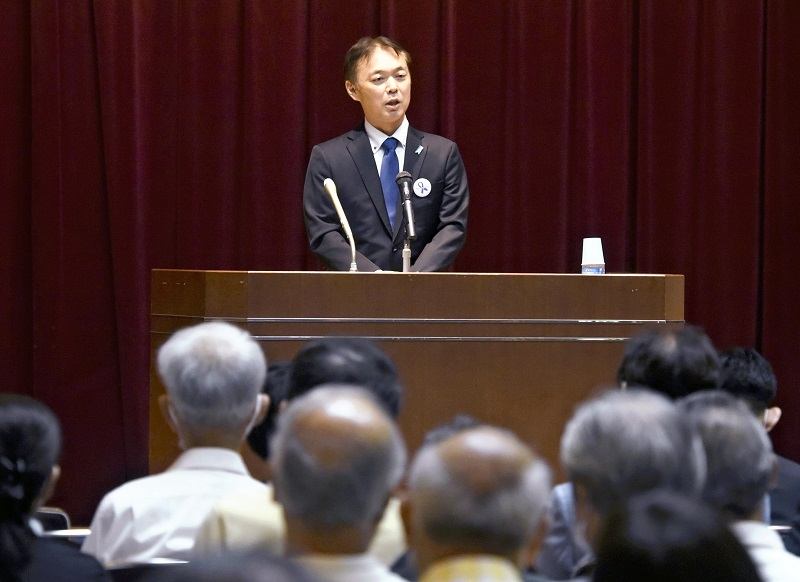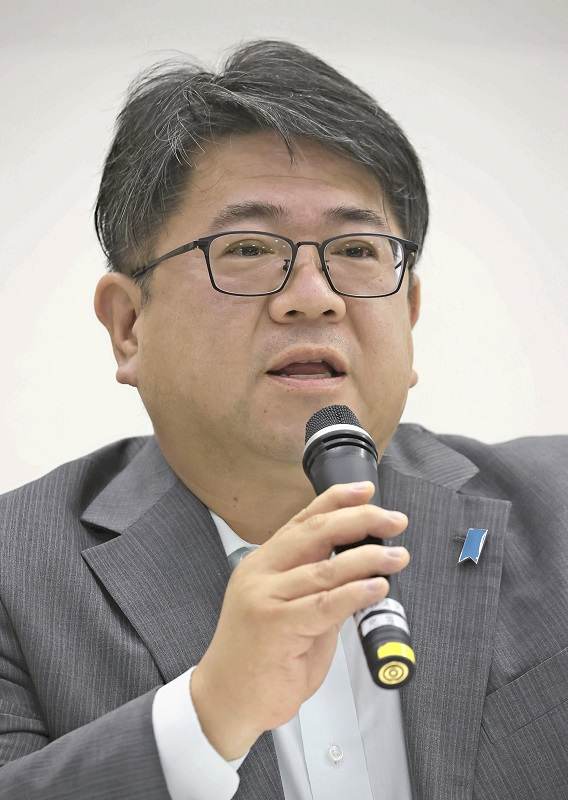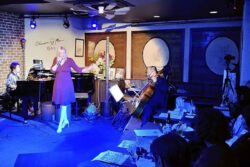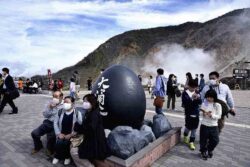In search of lost time 20 years after Pyongyang summit / Younger relatives take over the fight, vow to ‘not let the past fade away’

Koichiro Iizuka calls for the rescue of his mother, Yaeko Taguchi, and others in Urawa Ward, Saitama, on the afternoon of Sept. 17.
The Yomiuri Shimbun
1:00 JST, September 24, 2022
This is the third installment of a five-part series reflecting on the experiences of Japanese nationals abducted by North Korea, some of whom have returned to Japan, and their families over the past 20 years since the 2002 Japan-North Korea summit.
***
As the families waiting for their abducted relatives grow older, the abductees’ siblings and children are now assuming a central role in efforts to rescue them.
Saying “we can’t stand still,” younger relatives have continued to appeal for the victims’ return, thinking of the long fight by their parents’ generation to bring their loved ones home.
“The words he spoke in his final days were grave,” said Koichiro Iizuka, the eldest son of Yaeko Taguchi, who was abducted at the age of 22.
Shigeo Iizuka — Taguchi’s older brother, who passed away in December 2021 at the age of 83 — repeatedly said at a meeting he attended one month before his death, “I will never give up.”
Koichiro, now 45, has no clear memories of his mother. Around June 1978, Taguchi disappeared after leaving then 1-year-old Koichiro at a babysitting facility in Tokyo. Koichiro was taken in by his uncle Shigeo and raised as the second son in his family.
Koichiro learned this at 21, when he obtained a copy of his family register to get a passport. He still calls his mother “Yaeko-san.”
At the time of the Japan-North Korea summit on Sept. 17, 2002, he was working in Britain. Anxious to learn the outcome, Koichiro went online, only to find a news article saying Yaeko Taguchi had reportedly died.
Yaeko was already known as the person who taught Japanese to Kim Hyon Hui, who as a then North Korean agent was responsible for the Korean Air plane bombing in November 1987. Koichiro had assumed Yaeko was still alive, and tears rolled down his cheeks at the news.
In February 2004, about a year and a half after the summit meeting, he announced that he was the eldest son of Yaeko and moved to the forefront of rescue activities.
Saying “I want the mother and her son to be reunited” and “I want my father to meet his sister again,” Shigeo and Koichiro worked together for Yaeko’s return from then on.
In November 2007, Shigeo became the second representative of the Association of Families of Victims Kidnapped by North Korea. “When he went east, I’d go west. I’d watch my father’s complexion on the TV news to make sure he was still in good health,” Koichiro recalled.
About a month before his death, Shigeo wrote his worries on a piece of white paper in his hospital bed, putting down such words as “the family association” and “Yaeko.” His writing looked shaky.
“For the rest of my life, I will regret not having him see Yaeko-san again,” said Koichiro, biting his lip.
Before his death, Shigeo once said to Koichiro, “We mustn’t make you take over [the activities].” However, Koichiro became secretary general of the family association last December.
In addition to his regular job, Koichiro travels around the country, mainly on weekends. On Sept. 17, the 20th anniversary of the summit meeting, he took the stage at a rally in his hometown in Saitama Prefecture, which he had attended with Shigeo until a few years ago.
Koichiro ended his remarks with words he heard from his adoptive father: “I spent every day wondering if something could be done, only to let the days pass by without our having achieved anything. Even so, I won’t give up.”
A surge of regret

Nobuhiro Matsuki
Nobuhiro Matsuki, 49, is a younger brother of Kaoru Matsuki, who was 26 when he was abducted by a North Korean spy while he was studying in Spain in 1980. Nobuhiro joined the family association after the summit meeting.
Kaoru Matsuki’s name was among those of the eight people listed by North Korea as deceased. His father, Masuo, passed away at the age of 75 in 1990, 10 years after Kaoru was abducted.
His mother, Sunayo, died in January 2014 at the age of 92. “I decided that we had to make our move,” Nobuhiro recalled.
Over the last 20 years, he has seen many parents pass away without being reunited with their abducted children. Every time he heard this sad news, he felt a surge of regret.
For three years now, Nobuhiro has been conveying the sadness of the abduction issue to elementary and junior high school students at a government-sponsored event held every summer. “We mustn’t let the abduction issue fade into the past, particularly for the sake of the parents who died with regrets,” he said.
All the core members of the family association now belong to Nobuhiro’s generation. They have jobs and families, and the association’s activities sometimes cut into their time with their loved ones.
But Nobuhiro vowed: “We can’t just let time pass by. We’ll do everything we can.”





